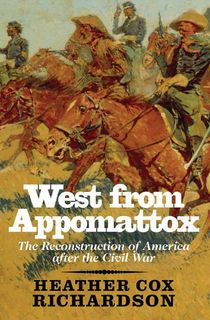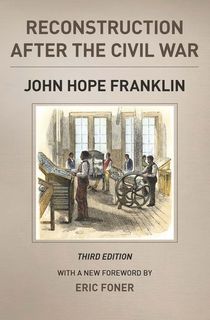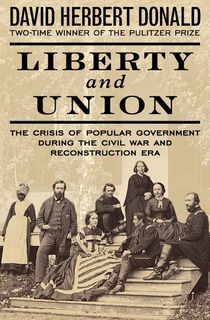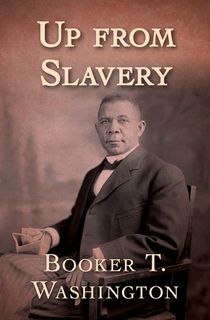Often mischaracterized as an era of rebuilding for the white South after the Civil War, Reconstruction was a defining moment in time for America only rivaled by the Revolutionary War. We've collected a variety of books about Reconstruction that allow readers to situate this vital, but often forgotten era, in both its own moment and in the parallels that can be found in modern times.
Not only did the years 1865 through 1877 see the completion of the federal effort to abolish slavery (at least as it was known at the time), but it was also a time that newly freed African American men and women were able to join workforces and enter communities they were previously excluded from. The steps were slow and brought their own set of tensions to handle, but the impacts were significant, thanks in no small part to federal assistance that eased the transition.
Related: 19 Essential Civil War Books
The short-lived era of Reconstruction saw a number of African American leaders elected to political positions, from local roles all the way to representation in the House and Senate.
Unfortunately, many of the gains were quickly and violently brought to an end by white citizens who saw the extension of Black people's rights as a curtailment of their own. As a major depression racked the country in 1873, anger became widespread. Lynching and other violence spread across the nation, and local and federal rollbacks of the right to vote began. Newly implemented poll taxes and grandfather clauses kept formerly enslaved people from voting and resulted, as intended, in a broad loss of representation for Black citizens across the country.
With the negotiated election of Rutherford B. Hayes in 1877 on the condition that federal troops be removed from the South, the Reconstruction era closed. Without the guiding hand of the federal government, states across the country—not just in the South—felt free to return to their discriminatory ways.
Related: Illuminating Books About the History of Race in America
As new states ratified their constitutions, long-standing political members were ejected from the direct engagement they had been participating in for decades. The late 19th and early 20th century saw a near reversal of the progress made in some states, building tensions that would not be addressed until the height of the Civil Rights Movement.
The promise and the failure of the era echo into this day. With these six books about Reconstruction, readers will discover a broader understanding of the ramifications of the Civil War far beyond the end of slavery.

West from Appomattox
Reconstruction helped forge America's identity for its continuing existence, crafting a nation of three distinct regions—the North, the South, and the West—that would quickly rise to become a major player on the world stage. Heather Cox Richardson examines primary accounts from ordinary civilians, demonstrating the diversity the classification of "citizen" has always held, comparing their thoughts to prominent figures between the presidencies of Abraham Lincoln to Theodore Roosevelt. West from Appomattox clarifies just what Reconstruction entailed for the entire nation, and how much more impactful it was than the immediate rebuilding of the South.

Reconstruction after the Civil War, Third Edition
African American historian John Hope Franklin, former president of the Organization of American Historians and Presidential Medal of Freedom recipient, looks at this time period with the aim to dispel common misinterpretations, using carefully evaluated research to explore the role of former slaves and slaveowners in southern states, and those state's legislative relations with the North. Championing the ideals of accuracy and comprehensiveness, the third edition has taken into account the new waves of scholarly research that have been produced since the original publishing in 1961.

Liberty and Union
The Civil War is certainly the most overtly violent period in American history, but the era of Reconstruction carried its contention and turmoil for decades. Displaying the potential for chaos in politics to rival that of war, David Herbert Donald examines the commonalities as well as the differences of the North and South during the antebellum and postbellum eras. With expansions westward and waves of enfranchisement followed by disenfranchisement, the only consistent description of these periods is how fluid and shifting they were for all citizens. Introducing a degree of philosophy into the varied analysis of Reconstruction, Donald uses the events of the era to approach a provocative topic: democratic societies' ability to reconcile majority rule with minority rights.

Black Reconstruction in America
Prominent American sociologist, civil rights activist, historian, socialist, and writer, W.E.B Dubois was the first African American to earn his doctorate from Harvard. He worked at Atlanta University as a sociology, economics, and history professor, and was one of the founders of the NAACP. Published in 1935, Black Reconstruction in America is a detailed look at African American society and politics in the 20 years following the Civil War. Emphasizing the struggle to make progress with the start of Jim Crow-era policies, Du Bois's research and insight contextualize America's foot-dragging nearly a century later.

Up from Slavery
Booker T. Washington was one of the most influential thinkers of the Reconstruction Era, gaining national fame with his "Atlanta Compromise" speech. It evolved into a movement that sought to appease Southern white lawmakers by encouraging African American citizens to pursue education, economic gains, and due process in the law while giving up the fight against Jim Crow-era policies. Initially supported by the likes of Du Bois, but later opposed as Du Bois and fellow activists founded the NAACP, the compromise highlights the difficulty to agree on which road to take for progress, even if the goals are the same.
Born into slavery on a Virginian tobacco farm, Washington reveals the journey of a former slave seeking education and eventually becoming an educator himself. The autobiography also delivers a stark criticism of Reconstruction policies, a vital firsthand account of an African American perspective post-Civil War.

Splendid Failure: Postwar Reconstruction in the American South
It's crucial to emphasize the well-intentioned programs of the era, but it's equally important to be critical of how those very Reconstruction programs were overthrown. Michael W. Fitzgerald argues that as reactionary sentiments from the South rose, financial miscalculations and impractical policy plans led to the perceived validation of racist ideology throughout the nation. Splendid Failure takes a very pessimistic view of the Reconstruction Era, highlighting how it led to a chaotic perpetuation of racial discrimination and twisted narratives up to the modern-day.
Featured photo of Booker T. Washington, Frederick Douglas, W.E.B Du Bois: Wikimedia Commons


